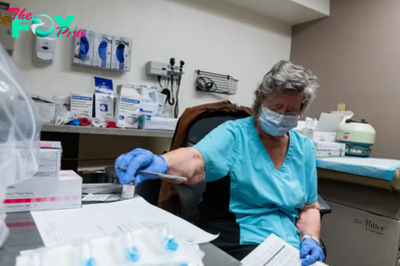Health
Abortion seekers continue to flood Colorado for care. 85% of people requesting travel help are Texans.
Requests for help to a Colorado fund that pays for abortions and associated travel expenses have climbed to an estimated $2.5 million this year, up from $212,000 before the U.S. Supreme Court struck down the constitutional right to abortion.
The Cobalt Abortion Fund has already spent more than twice as much in the first three months of this year than it did in the entirety of 2021, the year before the landmark ruling that allowed states to decide abortion laws.
About 60% of the people that received help paying for abortions so far this year were not from Colorado, according to data released Thursday by Cobalt, a Denver abortion advocacy nonprofit that manages the fund. And 85% of those who received assistance to pay for airfare, Uber rides, meals and child care were from Texas, where abortion is effectively banned after six weeks into a pregnancy.
“These abortion bans in other states have really led to a breakdown in the full spectrum of reproductive health care access across the country,” said Karen Middleton, president of Cobalt. “Our abortion fund is bearing the brunt of having to hear from more people who have no other options and no other place to go.”
Texas’ abortion law went into effect in August 2022. In Arizona, abortion will be illegal for a few months beginning in June. That’s the result of an Arizona Supreme Court ruling last month reinstating a Civil War-era ban on nearly all abortions. That law is set to take effect in August, but lawmakers have repealed the old law so that by the fall, Arizona will go back to banning abortions after 15 weeks of pregnancy.
Florida’s new ban on abortions after six weeks of pregnancy took effect May 1, and Colorado is already receiving an influx of calls from people in Florida who need abortions, said Melisa Hidalgo-Cuellar, director of the Cobalt Abortion Fund.
About 20 states have banned or limited abortion since the historic Supreme Court ruling, called Dobbs v. Jackson Women’s Health Organization. Colorado has no restrictions on when during a pregnancy a woman can get an abortion.
“I can’t emphasize enough, for a patient who has to leave their state in order to get the care they need is really traumatizing for many of them and it is difficult to do,” Middleton said. “Abortion is health care, and reproductive health care should be available in every state and, most importantly, in the state where you live.”
In 2021, the year before Dobbs, the abortion fund helped 1,154 people pay for abortions and 34 pay for Travel. In some cases, Travel expenses are for Colorado residents who need to come to Denver from a rural area that does not have an abortion clinic.
In 2023, the fund saw a “major jump” in requests, Hidalgo-Cuellar said. It helped 2,395 people pay for abortions and 1,547 pay for Travel expenses. Total spending in 2023 was $1.26 million, an amount that the fund is predicting will double this year.
The fund is providing financial assistance to pay for abortions for about one-sixth of people who received abortions in Colorado, where there were 14,691 abortions last year, according to the Colorado Department of Public Health and Environment.
Requests for help with travel costs, which can include child care, pet boarding and meals, are declining among Colorado residents, a trend Hidalgo-Cuellar attributed to increased access to virtual health care and medication abortions via mail.
☀️ READ MORE
Does Colorado allow abortions even after birth?
It’s taking longer to schedule abortions in Colorado and across the U.S. Doctors fear riskier, more complex procedures.
Federal judge blocks Colorado’s new law banning abortion pill “reversal”
In the first major abortion case since Dobbs, the U.S. Supreme Court is expected to rule at the end of June on a lower court’s ban of mifepristone, a drug used in medication abortions.
Cobalt, which raised $4.2 million last year, has increased fundraising efforts this year in order to meet the increased requests for financial help, Middleton said.
Of the 14,691 abortions in Colorado last year, 4,244 were for people from out of state, according to the state health department. That percentage — roughly 29% of abortions were for out-of-state residents — is the highest Colorado has seen since at least 2004, which is the farthest back data provided by CDPHE goes. Historically, the percentage was around 10%.
People from Texas made up the overwhelming majority of out-of-state residents receiving abortions in Colorado — 2,846 in 2023, up from 233 in 2020, the year before Texas lawmakers passed a law significantly restricting abortions. In the early-2000s, typically fewer than 20 people from Texas per year sought abortions in Colorado, according to the state data.
Wyoming, Oklahoma and South Dakota were the states with the next highest number of residents seeking abortions in Colorado in 2023, with 246, 181 and 158 people, respectively. Both Oklahoma and South Dakota ban abortion in most circumstances, while a ban in Wyoming is currently blocked by the courts.
Meanwhile, though the number of abortions among Colorado residents is rising, the state’s abortion rate is in line with the long-term average.
Colorado recorded an abortion rate of 8.45 in 2022 — that means there were 8.45 abortions per 1,000 women in the state between the ages of 15 and 44. That’s slightly below the average going back to 2004.
-

 Health7h ago
Health7h agoThe Surprising Benefits of Talking Out Loud to Yourself
-

 Health9h ago
Health9h agoDoctor’s bills often come with sticker shock for patients − but health insurance could be reinvented to provide costs upfront
-

 Health1d ago
Health1d agoWhat an HPV Diagnosis Really Means
-

 Health1d ago
Health1d agoThere’s an E. Coli Outbreak in Organic Carrots
-

 Health2d ago
Health2d agoCOVID-19’s Surprising Effect on Cancer
-

 Health3d ago
Health3d agoWhat to Know About How Lupus Affects Weight
-

 Health5d ago
Health5d agoPeople Aren’t Sure About Having Kids. She Helps Them Decide
-

 Health5d ago
Health5d agoFYI: People Don’t Like When You Abbreviate Texts



























